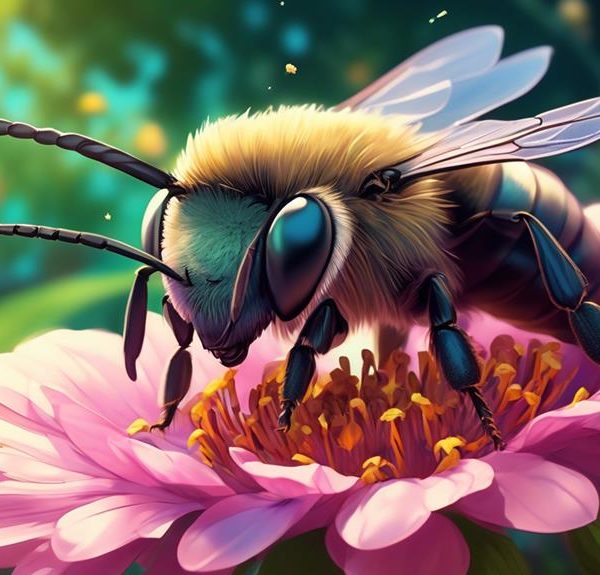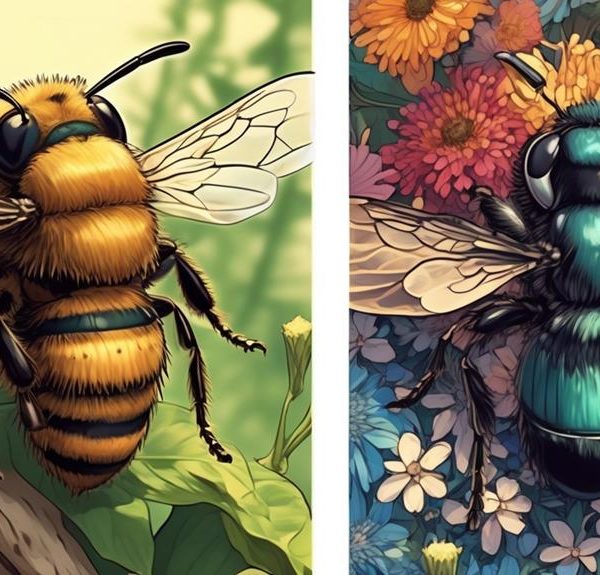Intrigue your mind with the surprising benefits of Mason bees, unsung heroes of the insect world, and their crucial role in our ecosystem.

Are Mason Bees Beneficial
Like a tiny, buzzing architect, the mason bee earns its name from the unique way it builds its nests. You've probably seen these industrious little creatures flitting around your garden, but have you ever stopped to consider their significance?
Mason bees, despite being less well-known than their honey-producing cousins, play a vital role in our ecosystem. Intriguingly, they might even be more beneficial to us than honey bees in certain aspects. But how can such a small creature be so impactful?
Stay with us to uncover the surprising truth about these unsung heroes of the insect world.
Key Takeaways
- Mason bees are efficient pollinators, transferring pollen as they gather nectar.
- Mason bees contribute to biodiversity by visiting a wide range of flowers.
- Mason bees assist in the production of fruits, seeds, and nuts, supporting the food chain.
- Mason bees can be attracted to gardens by planting native, open-faced flowers and providing suitable nesting sites.
Understanding Mason Bees
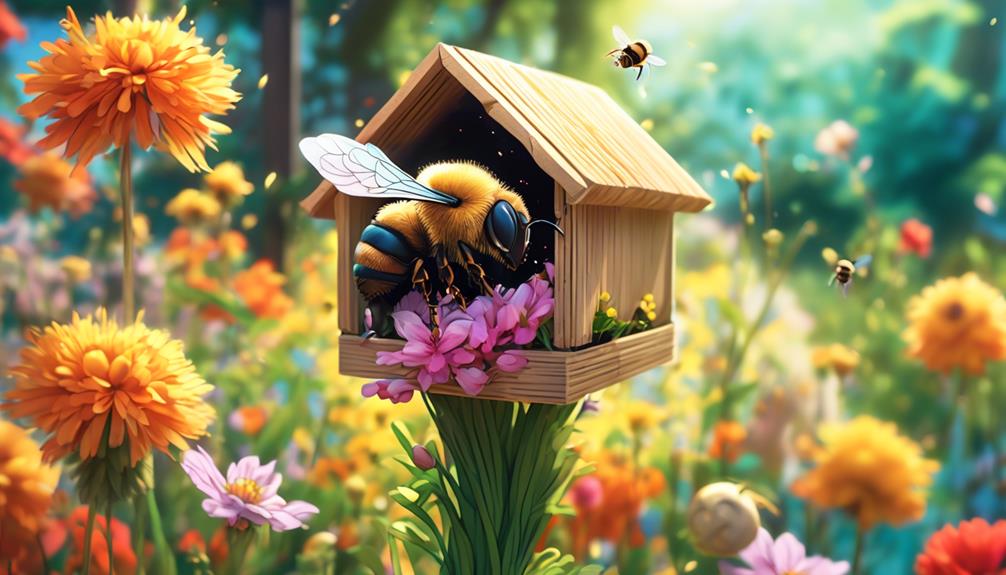
To fully grasp the role of Mason bees in our ecosystem, you'll need to delve into their unique biology, behavior, and contributions to pollination.
Unlike honeybees, Mason bees are solitary creatures, each female constructing her own nest in small cavities or hollow twigs. They're named for their habit of using mud or other masonry products to seal their nests.
You'll find them to be efficient pollinators, transferring pollen from male to female flower parts as they gather nectar. Interestingly, they're not picky eaters, which means they can pollinate a wide range of plants.
Their behavior also plays a crucial role in their ecological contribution. They're known for their extraordinary efficiency; a few Mason bees can do the work of several honeybees. This makes them an invaluable asset in orchards and gardens.
Furthermore, Mason bees have a gentle nature, unlike some bee species. They rarely sting unless threatened or trapped, making them relatively safe around children and pets.
In essence, these bees are integral to our ecosystem due to their pollination ability, industrious nature, and non-aggressive behavior. Understanding their biology and behavior allows you to appreciate their importance.
Mason Bees and Pollination
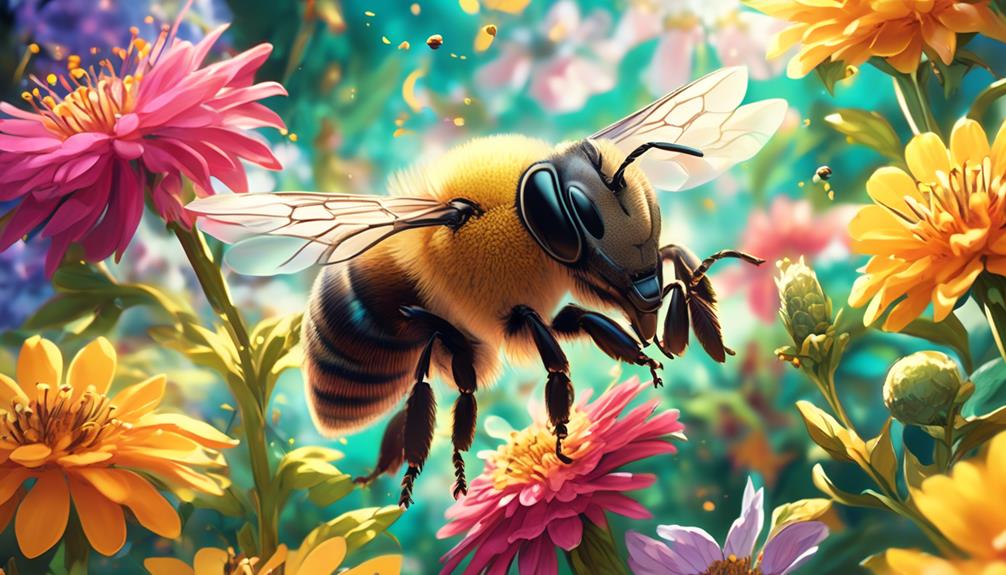
Diving into the world of Mason bees and pollination, you'll discover their remarkable efficiency, pollinating a multitude of diverse plants with precision and purpose. Unlike honeybees that collect pollen on their hind legs, Mason bees carry pollen on their abdomen, which has a higher chance of contact with the pistils of flowers, resulting in more effective pollination. They're also less selective, visiting a wide range of flowers, therefore contributing to the biodiversity of our ecosystems.
Your understanding of their pollination process won't be comprehensive without delving into their solitary nature. Unlike social bees, Mason bees operate alone, each female acting as a queen. This independence boosts their productivity, as each bee is capable of pollination instead of having designated worker bees.
Moreover, they're early risers, often active before honeybees. This trait makes them crucial in pollinating early blooming plants that other pollinators might miss. Their ability to function in cooler temperatures further expands their pollination window.
Benefits to the Ecosystem
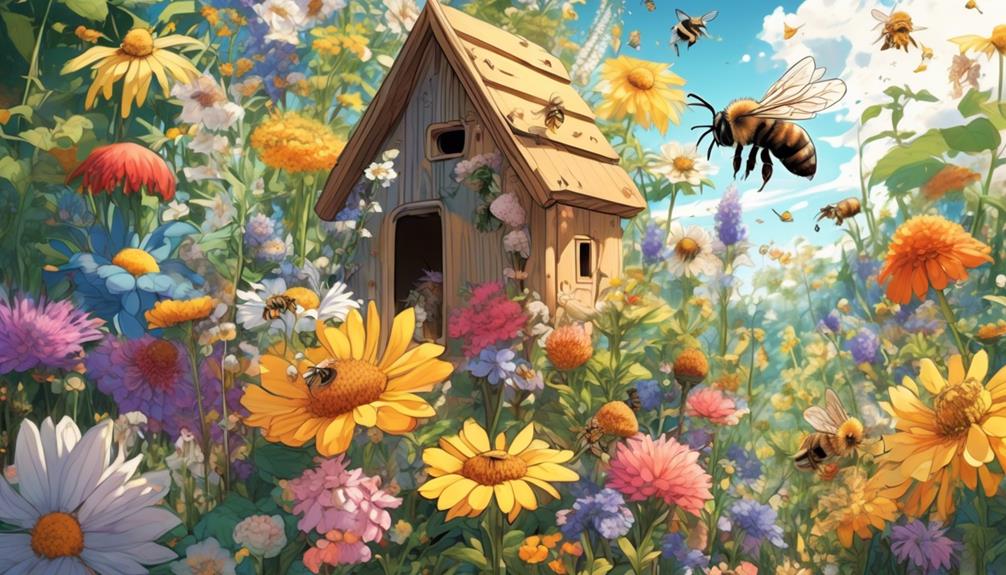
When considering the wider ecological impact, it's clear that Mason bees' pollination prowess significantly bolsters biodiversity and supports a healthy, vibrant ecosystem. They're instrumental in ensuring the survival of various plant species, which in turn provide food and habitat for other organisms.
In a more detailed perspective, Mason bees contribute three distinct advantages.
Benefit | Explanation | Impact |
|---|---|---|
Biodiversity Promotion | By pollinating diverse plant species, Mason bees help maintain biodiversity. | A diverse ecosystem is more resilient and adaptable. |
Food Chain Support | They assist in the production of fruits, seeds, and nuts which serve as food for other creatures. | This enhances the stability and balance of the food chain. |
Habitat Creation | The pollination process results in the growth of plants that provide shelter for other organisms. | This fosters a thriving ecosystem with a variety of habitats. |
Mason Bees Vs Honeybees
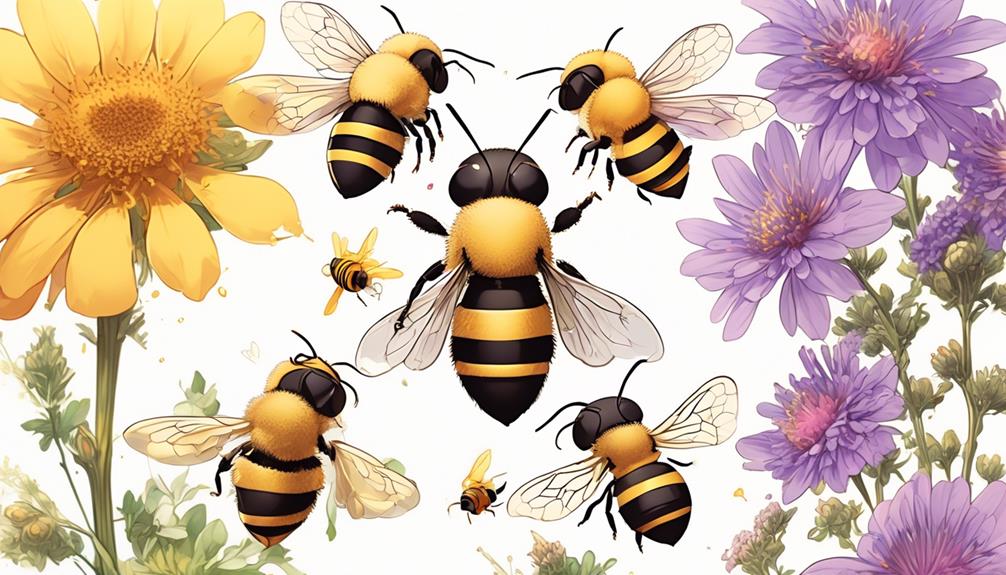
In a face-off between Mason bees and Honeybees, you'd find that these two species play distinct yet equally important roles in our ecosystem.
Mason bees are solitary creatures that nest in pre-existing holes and lay their eggs individually. They're known for their high efficiency in pollination. In fact, you'd be surprised to learn that a single Mason bee can pollinate as much as a hundred Honeybees can.
Contrarily, Honeybees are social insects, living in large colonies with a complex societal structure. They produce honey, a valuable resource, and their more extensive flight range allows pollination over larger areas. However, they're less efficient pollinators compared to Mason bees.
You'd note that while Honeybees have been the primary focus of conservation efforts due to their declining populations, the importance of Mason bees shouldn't be underestimated. They're hardy creatures, resistant to many diseases that affect Honeybees and can thrive in colder climates.
It's crucial to understand that both these bees contribute significantly to biodiversity and crop pollination. Therefore, rather than viewing it as a competition, you'd be better off recognizing the unique strengths and contributions of both bees to the ecosystem.
Attracting Mason Bees to Your Garden
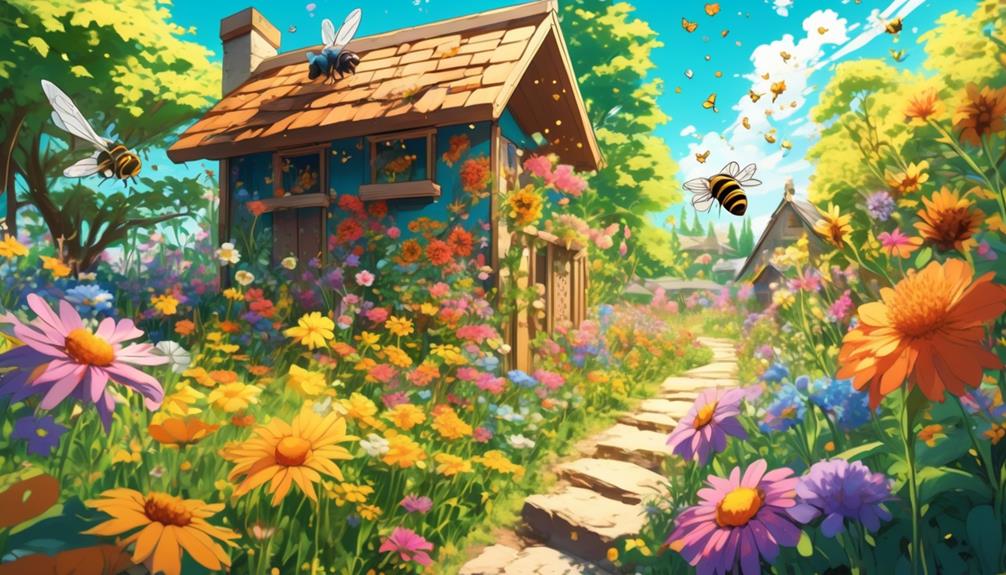
Recognizing the unique strengths and contributions of Mason bees to the ecosystem, you might be wondering how you can attract these efficient pollinators to your own garden. It's simpler than you might think.
Firstly, make your garden appealing to them. Mason bees are particularly drawn to native, open-faced flowers. Incorporating a variety of such plants into your garden can act like a beacon to these bees. They're also attracted to fruit trees, so you might consider planting a few if you haven't already.
Next, provide a suitable nesting site. Mason bees prefer hollow reeds or tubes, typically made of wood or bamboo. You can easily purchase a mason bee house, or even construct one yourself. Ensure that it's placed in a sunny, east-facing location to warm up the bees in the morning.
Lastly, avoid using pesticides. These chemicals can be harmful, even lethal, to Mason bees. Adopting organic gardening practices not only protects these pollinators but also contributes to a healthier ecosystem overall.
Frequently Asked Questions
What Are the Potential Risks of Having Mason Bees in Your Home?
While you might worry about potential risks of mason bees in your home, they're actually quite harmless. Unlike honeybees, they don't swarm or aggressively protect their nests. You'd rarely get stung unless you directly handle them.
However, they might drill holes in wood structures, which could cause minor damage. They're also attracted to existing holes, so they could nest in unwanted areas.
It's best to provide them with a suitable nesting space outside.
How Long Do Mason Bees Typically Live?
You're inquiring about the lifespan of mason bees. Typically, these bees live for about a year.
However, most of their life is spent in their cocoon stage, over the winter months. The adult phase, when they're active and visible, lasts only for a few weeks in the spring.
Do Mason Bees Sting or Pose Any Threat to Humans or Pets?
You're likely wondering if mason bees pose a threat to you or your pets. Good news, they're generally harmless! While they can sting if threatened or trapped, it's very rare. Their stingers aren't barbed, so they can't leave it in your skin. Also, their venom is much less toxic than that of a honeybee.
What Are the Legal Implications of Breeding Mason Bees?
You're asking about the legal implications of breeding Mason bees. Generally, there aren't any legal restrictions on breeding these bees. They're not classified as pests, nor are they protected species. However, you should check local regulations as they can vary.
It's also important to consider the ethical implications, like ensuring they've suitable habitats and don't disrupt local ecosystems. Always research and respect both the legal and environmental aspects of beekeeping.
How Do Changes in Climate or Environment Affect Mason Bees?
Yes, changes in climate or environment significantly affect Mason bees. When it's too hot or too cold, they struggle to survive. Pesticides and habitat loss also pose threats.
Mason bees are sensitive to air pollution and changes in plant life, needing specific plants for food. You'll see less bee activity and lower pollination rates if conditions aren't right.
Essentially, a stable, clean environment is crucial for their survival and their valuable role in pollination.
Conclusion
In conclusion, you'll find that mason bees are undeniably beneficial. They're tireless pollinators, contributing immensely to our ecosystem.
They may not produce honey like their cousins, but they're less aggressive and easier to attract to your garden. Incorporating them into your local flora can contribute to biodiversity and the health of your plants.
So, don't overlook these little dynamos – they play a vital part in our world's intricate ecological balance.

